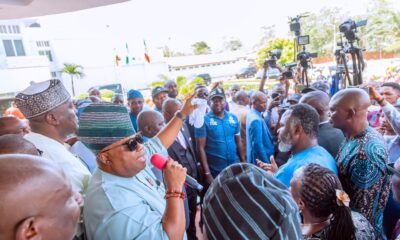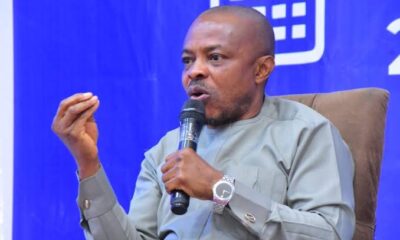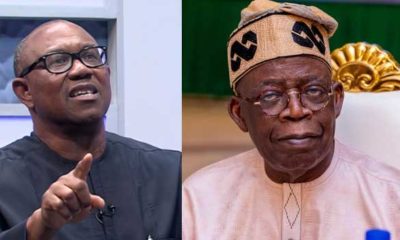Energy
FG, Independent Marketers, Labour At Daggers Drawn Over Fuel Price

Palpable fear of mass tumult against the Nigerian Government owing to harsh economic realities might have forced the hand of the authorities in making public statements that there would be no further increase in the pump price of Premium Motor Spirit, popularly called petrol.
But this has not gone down well with the independent marketers, who insist that given the current market realties, there would be costs that the government has to take up or would be passed to the people.
In plain language, the marketers are insisting that either subsidy is reinstated or market forces would continue to determine the prices of products.
Biztellers served you a report that the Nigerian National Petroleum Company Limited (NNPCL) made it clear that it was not considering an upward adjustment in the pump price of petrol.
The state oil company, took its verified X (initially Twitter) handle, @nnpclimited late Monday to make the assertion.
The tweet, seen in several quarters as a move to douse tensions, was addressed to customers.
It reads, “Dear esteemed customers, we at NNPC Retail value your patronage, and we do not have the intention to increase our PMS pump prices as widely speculated.
“Please buy the best quality products at the most affordable prices at our NNPC Retail Stations nationwide.”
Being sensitive to the fact that he had been sitting on a keg of gunpowder, President Bola Ahmed Tinubu followed up on the tweet by NNPCL with his own tweet, assuring that there would be no hike in the pump prices.
On Tuesday, President Tinubu in an attempt at reassuring the populace, declared that there would not increase in the pump price of petrol.
President Tinubu at his verified official X handle, @NGRPresident tweeted, “Mr President and the industry stakeholders who have been widely consulted and convinced, based on information before them, that we can maintain current pricing without reversing our deregulation policy by swiftly cleaning up existing inefficiencies within the midstream and downstream Petroleum sector.
“This is why there is no increase in prices at this time”.
The statement, which was per say, issued under the seal of President Tinubu under the subject, “On the Purported Pending Increase in Fuel Prices” was signed by Official Spokesperson to President Bola Ahmed Tinubu, Ajuri Ngelale.
Many informed Nigerians have been reacting to the posturing from government quarters – the NNPCL and the Presidency, in a way that has made it begin to sound like a grandstanding by the authorities.
For instance, the statement from President Tinubu had spoken about consulting and convincing stakeholders with available information.
It also pointed to ‘cleanup’ of certain areas of the midstream and downstream sector without letting the world know what was required, who would be responsible and how long it would take.
The first salvo against the attempt to pool the wool over the people’s eyes was from fiery Nigerian journalist, Rufai Oseni, who asked for details of what it cost to get petrol to the pump for dispensing to consumers.
He took to his verified X handle, @ruffydfire to call attention to the fact that information being bandied in the public might have been inadequate.
He tweeted, “Dear NNPC, kindly let us know how you calculate petrol prices in Nigeria, stating inspection cost, Landing from Amsterdam or Rotterdam to Togo or to Nigeria, then state other cost components that make up the final price, factor in fx fluctuations.
“Thank you”.
Another sensitive aspect is that those in power want the world to believe that the market has been deregulated and will remain so but the reality on ground speaks differently.
Fuel queues are already beginning to show in certain parts of Nigeria, including Lagos and Abuja, while price hike is manifest with independent marketers having adjusted pump prices in different locations in tune with realities.
The base pump price of petrol has shifted from N612/litre to N670/litre. It was gathered that that the minimum price applied to NNPCL Retail outlets and some other filling stations, while others determined what prices to sell at.
Expectations are rife that this adjustment would see petrol being sold at above N800/litre at filling stations across Nigeria in locations outside Lagos and Abuja.
It had been hovering around N750/lite in those locations before this recent impact of foreign exchange and Brent price at the global market.
As that is playing out, Ngelale shared a graphic presentation of pump prices of petrol across West Africa, depicting Nigeria as the lowest.
Interestingly the second and more important salvo had come from the stakeholders that President Tinubu’s statement claimed were consulted and convinced.
The Independent Oil Marketers have taken the position that only a return to the subsidy regime would see the current price maintained.
Secretary, Independent Petroleum Marketers Association of Nigeria, Abuja-Suleja, Mohammed Shuaibu, on Tuesday, opined that government should reconsider reversing itself because the subsidy removal has come with adverse economic impact.
He said, “Let them not do the needful. (Else, there) will see the consequences. We learned this morning that Kenya, which equally removed subsidy and noticed that its effect was so hard on the citizens, has again resumed the subsidy regime for the period of two months,”
He added, “Government is about the people and must have a listening ear. For Nigeria, how can we be an oil producing nation with four refineries and all of them are down?
“When he (President Tinubu) announced it (subsidy removal), we said it was going to bring problems. Are we not feeling the consequences of that announcement now? It is forex that largely determines the cost of petroleum products here.
“Marketers are not willing to import products again. So, if the government is going to relax the removal of subsidy for a while, it should better do that as a matter of urgency.”
While the government quarters and the relevant stakeholders are engaged in what now appears to be mind games and structured perception management messaging, Oseni on Tuesday shared what he considered the presenting landing cost of petrol in Nigeria.
He tweeted, “A breakdown of the landing cost of petrol showed that while product cost, as of yesterday (Monday August 14, 2023), was N627.82 per litre, finance cost was N11.61, and operations/administrative cost, N12.32, bringing the total landing cost to N651.75 per litre”.
As things stand, it appears that the reality confronting Nigerians is sterner economic hardship which would follow additional increases in the pump prices of petrol.
Alternatively, the government would have to swallow her pride and go back to subsidy.
Analysts are of the opinion that all outlets serving petrol below the calculated landing cost must have an avenue to recoup the outlay, which signals the obituary of the subsidy removal policy of the President Tinubu administration.
Given that organised labour, through the Nigerian Labour Congress (NLC) had placed relevant stakeholders on notice of immediate industrial action any time pump price of petrol is increased, it portends that a lot of wisdom would be required to avert crises in the present circumstances.
Energy
NLNG Improves Nigeria’s Domestic LPG Supply Operational Efficiency

In line with its continuous improvement culture, the Nigeria LNG Limited (NLNG) will be working closely with its stakeholders to improve operational efficiency in its domestic Liquefied Petroleum Gas (DLPG) supply in Nigeria.
According to a statement from its General Manager, External Relations and Sustainable Development, Sophia Horsfall, this was highlighted at an engagement session with stakeholders in Lagos.
It was gathered that the NLNG plans to enhance engagement and improve operational efficiency of its LPG supply through digitalisation of some of its processes which include a new platform designed to streamline regulatory processes, optimise risk management, and enhance the buyer experience. The platform will feature IT-supported relationship management, automated issue resolution, centralised real-time payments, and improved case management systems, ensuring a seamless supply process despite market shifts and external pressures.
ALSO READ: Ifon-Ilobu Crisis: Adeleke Assures Of Quick Restoration Of Peace
Manager, Commercial Contract Management, NLNG, Tolulope Longe, reiterated that the planned improvements will enable and consolidate NLNG’s resolve to delivering 100% of its LPG supply to the Nigerian market.
She said a strategic roadmap was in play to ensure the achievement of NLNG’s longstanding goals of LPG being accessible and available in the country, aligning with its vision of being a globally competitive energy company, improving lives sustainably. She also harped on the significance of these improvement initiatives and the Company’s push for LPG utilisation as a clean energy source alternative to kerosene and other fossil fuels
Longe noted that the Company remained focused on growth and sustainability of the LPG market by continuously enhancing its supply processes in collaboration with offtakers. She stressed NLNG’s commitment to collaborating with stakeholders to maintain pricing stability and long-term market viability. While acknowledging industry concerns, she noted the importance of operational efficiency in meeting market demands.
NLNG aims to strengthen stakeholder engagement and improve market efficiency in the LPG sector through enhanced customer interactions, minimised schedule disruptions, timely confirmations and deliveries, and prioritisation of customers with demonstrable capacity. As it adapts to market realities, NLNG remains committed to driving sustainability and delivering lasting value to Nigerians.
Energy
Savannah Energy Completes SIPEC Acquisition

In line with its announcement of 19 March 2024, Savannah Energy has completed the acquisition of Sinopec International Petroleum Exploration and Production Company Nigeria Limited (SIPEC).
Making the revelation, an elated Chief Executive Officer, Savannah Energy, Andrew Knott, said, “We are delighted to announce the completion of the SIPEC Acquisition – the achievement of one of our core business priorities for 2025. Our focus at the Stubb Creek Field will now turn to progressing the expansion project, which we expect to increase production by almost three quarters over the course of 2025/26. I look forward to updating shareholders on this in the coming months, as well as on the progress we make towards achieving the other core business priorities we outlined to shareholders earlier this month.”
He expressed gratitude to the Nigerian government for making the acquisition possible, having required several levels of regulatory approvals.
ALSO READ: Tinubu Plans 10,000 Electric Vehicles For North-East
“I would like to thank the Government of Nigeria for the support that they have shown our Company in approving the SIPEC Acquisition and I extend a warm welcome to the SIPEC employees joining Savannah today,” he added.
Biztellers reports that the SIPEC’s principal asset is the 49% non-operated interest in the Stubb Creek oil & gas field (“Stubb Creek Field”), which is operated and 51% owned by Universal Energy Resources Limited (a Savannah affiliate company).
The SIPEC Acquisition increases Savannah’s Reserves and Resources base by approximately 30% from 151 MMboe to 197 MMboe. It adds 227 Bscf of 2C gross gas Resources at Stubb Creek Field, securing significant additional long-term feedstock gas available for sale to Accugas customers.
It was gathered that the transaction consideration was fully funded through a drawdown under a US$60 million Reserve-Based Lending debt facility arranged by The Standard Bank of South Africa Limited. At completion the cumulative consideration paid was approximately US$35.1 million (inclusive of approximately US$19.5 million of cash available to SIPEC), with US$2 million in deferred cash consideration payable in eight quarterly installments post-completion.
Savannah now intends to commence an up to 18-month expansion programme, which is anticipated to increase Stubb Creek Field gross production from an average of 2.7 Kbopd in 2024 to approximately 4.7 Kbopd.
Stubb Creek Field, located in Akwa Ibom State, Nigeria, is a producing oil field with considerable undeveloped, non-associated 2C gas resources. As at year-end 2024, Stubb Creek Field had an estimated 11 MMstb of 2P gross oil Reserves and 515 Bscf of 2C gross gas Resources1.
Commercial oil production started at Stubb Creek Field in 2015, with cumulative production of 8.1 MMstb to 31 December 2024. Oil produced at Stubb Creek Field is processed through production facilities onsite and then exported to the Qua Iboe terminal via a 25 km pipeline.
The Stubb Creek Field was converted to a 20-year petroleum mining lease in accordance with the Petroleum Industry Act 2021 and effective from 1 December 2023.
Energy
Shell On Place Of Infrastructure In Developing Nigeria’s Gas resources
Shell has called for the development of infrastructure to promote the growth of domestic gas and monetisation of the resource.
At a panel session at the just concluded Nigeria International Energy Summit (NIES) in Abuja, Managing Director Shell Nigeria Gas (SNG) Ralph Gbobo, said, “The infrastructure will support the delivery of gas from producers to consumers in an efficient way that is also transparent and cost effective.”
Ralph described infrastructure as the bedrock of a thriving gas industry, citing the Escravos – Lagos Pipeline System (ELPS) which feeds the domestic gas market as an example. He said: “If we can fully implement our regulations, a key one being the Network Code and maintain a stable Network where investors can get their returns, I can guarantee that we will see more players come into this space.”
ALSO READ: Shell Exhibition Delivers Value At Energy Summit
SNG which was established in 1988 has led the way in the provision of gas infrastructure in Nigeria, building gas distribution systems in Rivers, Abia and Ogun states through which it delivers gas to over 140 domestic, industrial and commercial customers. Last year, the company signed an agreement with the Oyo State Government to build a gas distribution infrastructure with the intention of delivering gas to businesses in the state and beyond.
Ralph explained: “Our experience at SNG shows that the task of expanding the Nigerian domestic gas market is a collective responsibility and not to be done by just a few players. It requires inputs from the regulatory, upstream, midstream and downstream sectors. The key to unlocking all these inputs is driving and implementing the right polices. The implementation of clear policies and incentives, allows for more investors to come into the domestic gas market be it in terms of gas production or infrastructural development. Investors need to be assured of a stable regulatory and fiscal market where their investments are guaranteed.”
He added: “Shell Companies in Nigeria have invested across the entire value chain of gas — Upstream, Midstream and Downstream having understood the potential of the commodity to accelerate industrial and economic growth in Nigeria.”






















